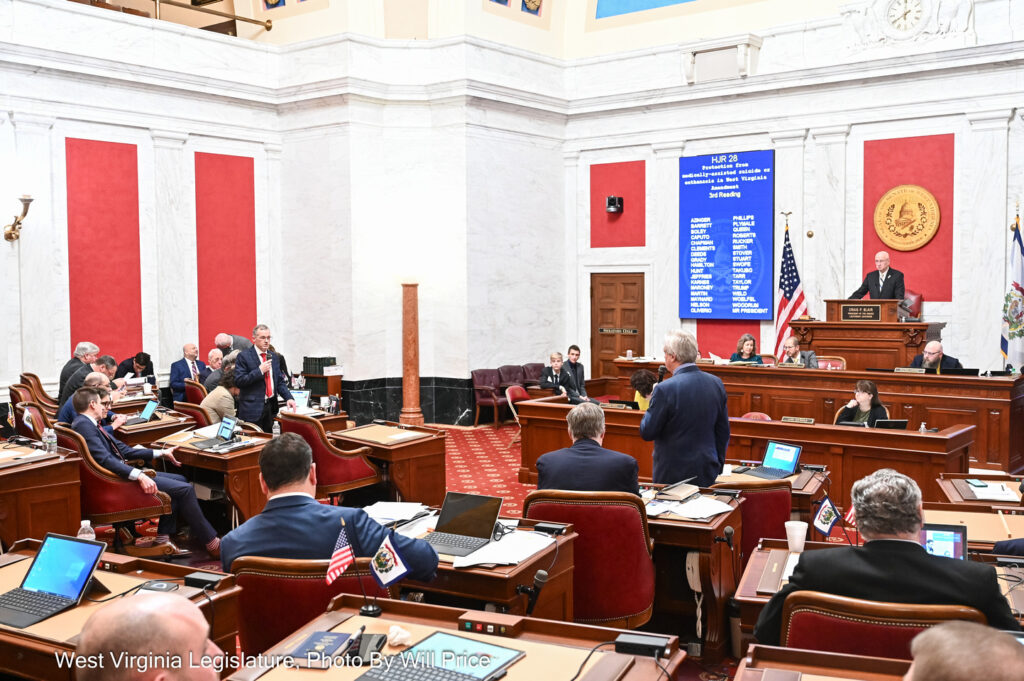West Virginia’s Republican-dominated state Legislature on Saturday concluded a 60-day session marked by budget disputes and controversial social issue bills that advanced but ultimately didn’t go anywhere.
Lawmakers conferenced behind closed doors Saturday to reach an agreement on a budget just under $5 billion, bills that would cut unemployment benefits, a Social Security tax cut and a 5 percent raise for teachers and other state workers, among other legislation. Those proposals now head to the desk of Republican Gov. Jim Justice, who is expected to sign them.
The Social Security cut and pay raises were passed after the budget process was thrown into chaos this week when lawmakers learned Justice’s office was in negotiations with the federal government over a potential $465 million COVID-19 funding clawback.
Lawmakers debated several iterations of the budget before coming to a final decision, leaving out a number of priority items including a tax credit to make child care more affordable for families and money for a new agriculture lab at West Virginia State University.
Lawmakers intend to meet for a special session to review those items in May, when the situation with the U.S. Department of Education is clearer, the legislative leadership said.
Lawmakers additionally passed bills Saturday to allow the sale of raw milk with a warning label about the increased risk of foodborne illness and allow virtual public school students and private school students to opt out of mandatory vaccines.
Another successful bill would give public school teachers the option to teach intelligent design, the theory holding that certain features of life forms are so complex they can best be explained by an origin from an intelligent higher power, not an undirected process such as natural selection. Intelligent design is overwhelmingly regarded as a religious belief by the scientific community and not a scientific theory.
Social issues dominated most of the conversation during the session, but many did not cross the finish line.
As the clock approached a midnight Sunday deadline to pass bills, Democratic Del. Mike Pushkin dragged out discussion on a proposed constitutional amendment that would have been placed on the ballot to prohibit non-U.S. citizens from voting in West Virginia elections, which is already illegal.
“I just don’t think it’s necessary to change the constitution that’s already in state code, something that isn’t taking place. It’s hard enough to get our citizens to vote,” Pushkin said, checking his watch.
“I would encourage all citizens to vote. Think of who you’re voting for when you cast that ballot,” said Pushkin, one of 11 Democrats in the 100-member House, just as time ran out.
Earlier in the session, the House of Delegates passed a bill to make schools, public libraries and museums criminally liable for distributing or displaying “obscene” materials to children. The Senate never took up that bill or failed bills passed by the House that would have restricted healthcare for transgender adolescents and allow teachers and other school staff with certain training to carry guns on school campuses.
The Senate passed a bill that would have made a video on fetal development produced by an anti-abortion group required viewing in public schools, but the measure failed to advance in the House.
Time also ran out Saturday for House lawmakers to vote on final passage of a “Women’s Bill of Rights,” which was almost sure to pass. Democrats labeled the proposal a dystopian bill that would give women no additional rights while enabling the GOP to suppress transgender people.
The legislation said “equal” does not mean “same” or “identical” with respect to equality of the sexes. The proposed wording in state statutes and official public policies would define a person’s sex as determined at birth without allowing substitutions of gender equity terms. The bill also would establish that certain single-sex environments, such as athletics, locker rooms and bathrooms, are not discriminatory.
The bill was championed by Republican women in the Legislature, including Del. Kathie Hess Crouse, who said “radical feminists” have “sought a world in which men and women are treated exactly the same in every single circumstance, regardless of physical differences.”
“The Women’s Bill of Rights aims to halt this radical agenda,” she said, speaking on the floor in support of the legislation.
The unemployment bill, which was rushed through the legislative process in the final days of session after hours of debate, left some lawmakers confused, even those who chose to support it.
The bill would increase work search requirements for unemployed people receiving benefits and freeze the rates those individuals are paid at the current maximum of $622 a week, instead of a system adjusting with inflation. People also would be able to work part-time while receiving unemployment and searching for full-time work. Current average benefits are around $420 a week.
The bill was a compromise from an earlier version of the legislation that would have reduced the number of allowable weeks for unemployment benefits from 26 to 24 and started benefits at 70% of the recipient’s average weekly wage before losing work and reducing benefits over the amount of time the person is out of work without getting a new job.
Supporters say they were concerned about the long-term solvency of the state’s unemployment fund. But Del. Democratic Del. Shawn Fluharty said the bill sends a bad message.
“Here we are just year in and year out finding ways to chip away at who actually built this state: the blue collar worker,” Fluharty said.
The Social Security tax cut bill follows a law signed in 2019 that cut income tax on Social Security benefits over three years for the state’s lowest earners, defined as those making less than $100,000 filing jointly and $50,000 for a single person.
The proposal approved by the Legislature Saturday would eliminate the tax for everyone else, also over a three-year period. The tax would be cut by 35 percent this year, retroactive to Jan. 1, and 65 percent in 2025. The tax would be phased out completely by 2026.






















